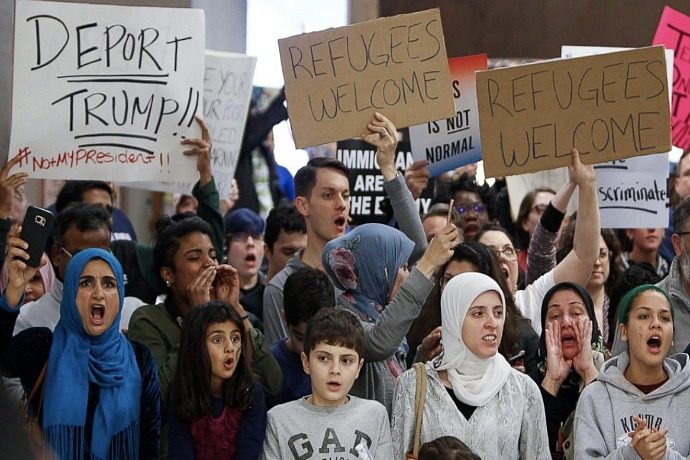The raucous “debate” about immigration—with Trump still working to stop immigration from certain countries, and deport millions of undocumented people, while thousands protest in the streets and halls of justice—hides the fact that the real debate is about the definition of citizenship.
Immigration exposes the tension between an idea of citizenship as identity and citizenship as a category of legal belonging. In the former case, being a citizen means that one shares culture, language, history with the sovereign group. In the latter, citizenship means the ability and obligation to be part of the demos, the body of people who decide on law, are obligated by the law, and benefit from the law. Obviously these two categories are not distinct, but the definition one privileges has enormous consequences.
Seyla Benhabib has argued (in The Rights of Others) that when the control of territorial boundaries is the same as sovereignty in the modern nation-state, the control of those “boundaries … seeks to ensure the purity of the nation in time through the policing of its contacts and interactions in space.” Keeping out certain foreigners preserves the identity of the state.
The legal conception of citizenship privileges the demands of international law and the right to emigrate over the demands of territorial boundaries. Further, the citizen is not defined by culture, language, or history but rather by democratic action.
Steve Bannon, the White House’s chief strategist, is a strong proponent of citizenship as identity, a position he made clear at this year’s Conservative Political Action Conference (CPAC) when he said that “we are a nation with a culture and a reason for being.…We’re a nation with an economy, not an economy just in some global marketplace with open borders.”
When these remarks are paired with Bannon’s speech to a Conservative Catholic group at the Vatican in 2014, where he praised a type of Judeo-Christian capitalism, the intent of Bannon’s remarks become clearer. The “culture” that Bannon refers to is a European Christian culture. In order to ensure that the United States continues to have that “culture and reason for being,” borders must be sealed.
It has also come to light that Bannon is a fan of the French novel The Camp of the Saints, which has been described as “racist in the literal sense of the term. It uses race to describe the book’s characters and describes the takeover of Europe by waves of immigrants that wash ashore like the plague.” Bannon has described immigration from Muslim majority countries as a “global Camp of the Saints.” It’s no surprise then that the media are full of stories of undocumented Latinx immigrants being rounded up, and not undocumented Canadian immigrants.
In part this debate is about religion. Bannon and his team at the White House (Stephen Miller, Gorka) have made clear that they do not consider Islam a religion worthy of the name, and that Muslims are under suspicion by default. Bannon, you will recall, is allied with a conservative wing of the Catholic Church situated in the Vatican. However, this is also an internal debate within religions, all of which contain both pro- and anti-immigration wings.
Two thousand years ago, during the Roman Empire, citizenship was also a life or death issue. During a year of drought, for example, patrons might donate tons of grain to a city for the hungry—but only for hungry citizens. As the historian Peter Brown has written:
The plebs [the general body of citizens] of Rome included many who were chronically undernourished and vulnerable to disease. They needed ‘civic’ bread so as to relieve their hunger. But they did not receive this bread because they were ‘poor.’ They received it because they could produce a tessera, a token that proved (in the manner of a modern passport) that they were ‘citizens.’
It was the Fathers of the Church and the Rabbis of the Mishnah who challenged these borders, boundaries and forms of belonging. In the fourth century, Basil of Caesarea’s homilies on hunger spoke about the poor as a class of people, independent of their being citizens or not.
The Rabbis of the Mishnah, also in the fourth century in Palestine, explicitly spoke of poor people who travelled from city to city. The cities, according to Mishnah, are obligated to supply them with food and lodging whether or not they were residents.
By the Middle Ages, as historian Mark Cohen has shown in his book Poverty and Charity in the Jewish Community of Medieval Egypt, there were a large number of hostels for the poor (sponsored by Christians, Jews, and Muslims) stretching across Europe, the Middle East, and North Africa. The common denominator of these institutions is that they did not rely upon political boundaries to relieve suffering.
The religious traditions of hospitality, refuge, and sanctuary created the vibrant multiform culture of diversity, welcome, and innovation that many of us claim as American. However, religious traditions of exclusion and purity rear their heads at regular intervals to demand higher walls and harder hearts. We are now at another inflection point, and we must choose wisely.





